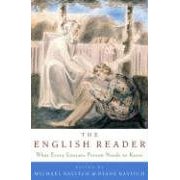From The Gadfly at edexcellence.net
While the thought that students should bother with the poetry of the Romantics, the prose of Darwin, the philosophy of Mill, or the speeches of Churchill is anathema to many, even the greatest critics of Western culture must concede that the English language that still unites us (though not as strongly as it should) has never been used more effectively than by those in the land of its birth--England. "The language has been shaped by those who have used it best," write the Ravitches in their introduction to this exquisite anthology. "Everyone who writes in English inherits this legacy, from Chinua Achebe to Saul Bellow, Salman Rushdie to Toni Morrison, Derek Wolcott to Seamus Heaney. These great contemporary writers transform the literary tradition in their own distinct ways, but their guideposts are the monumental achievements of English literature." We may choose to deny our students the history of Western civilization, and still survive. But deny our students English literature, and we excise the very font from which the versatility and beauty of the language we speak flows. Diane and Michael have given us the best argument for why English literature should never "go gentle into that good night"--the words of the language's masters themselves.
"A shortcut to being Lit Savvy. The greatest-hits package is a mix of experts from longer works and complete short pieces (poems, essays, speeches) that distills the eseence of great literature."
Hindu Times, February 7 2007
"This unique collection offers the best that has been thought and said."
Charleston Post & Courier
"The enduring impression is of ideas. Big, serious, complex ideas requiring attention spans not fed on sound bites and 15 second commercials. It's enough to tempt one to buy a booster
